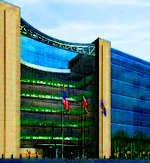 An earlier post here reported that the SEC has sent a letter to Intel inquiring as to how Intel Celeron microprocessors wound up in computers being sold in Cuba. According to an article in yesterday’s Wall Street Journal, Intel’s “misery” has a little company in arch-rival AMD, which also received a letter from the SEC inquiring as to how AMD chips wound up in a “supercomputer” in Iran as reported in December 2007. AMD’s response was similar to Intel’s response: “We have no earthly idea but we want to reaffirm that AMD complies with all laws forbidding exports to embargoed countries.”
An earlier post here reported that the SEC has sent a letter to Intel inquiring as to how Intel Celeron microprocessors wound up in computers being sold in Cuba. According to an article in yesterday’s Wall Street Journal, Intel’s “misery” has a little company in arch-rival AMD, which also received a letter from the SEC inquiring as to how AMD chips wound up in a “supercomputer” in Iran as reported in December 2007. AMD’s response was similar to Intel’s response: “We have no earthly idea but we want to reaffirm that AMD complies with all laws forbidding exports to embargoed countries.”
Avid readers of this blog will remember that we covered this story back in December 2007 when Iran announced that it had built its alleged supercomputer using AMD chips. A little detective work on our part also revealed exactly how the AMD chips made it to Iran. They got there by way of a reseller located in — quelle surprise! — the UAE. Who on earth would have ever imagined that the UAE would have been the source of the chips? Obviously, the SEC doesn’t read this blog or it wouldn’t have had to ask how the chips made it to Iran.
The WSJ article interviewed John Pike of GlobalSecurity.org who added some unintentional comic relief to the story:
John Pike, director of GlobalSecurity.org, a Washington, D.C., area think tank focused on security issues, said it’s puzzling that the SEC would be focused on the issue of computer chip exports to embargoed nations.
“Why SEC? Hard to figure, unless some rocket scientist wanted to create a really robust paper trail that these companies have no direct dealings with embargoed countries,” he said in an e-mail.
Naturally it’s puzzling to people who apparently know little about the SEC and what it does, although you might have thought that Pike might have at least caught some of the news reports on the SEC’s Office of Global Security Risk (“OGSR”). That office was created to respond to a Congressional mandate that the SEC assure that documents filed by publicly-traded companies adequately disclose global security risks arising from the international activities of those companies.
The OGSR has, as a result, focused, among other things, on issuers’ dealings with embargoed countries, as we noted here and here. So there’s no mystery, at least to the reasonably well-informed, as to what the SEC is up to and why. And it’s also quite clear that Pike’s wild speculation that the SEC is trying to create a “robust paper trail” that the companies weren’t dealing with sanctioned countries is, well, silly.
But wait, there’s more from Pike:
He said the embargo made sense since “it would be stupid to make it easy for Iran to get this stuff.”
As if it were hard, in this instance, for Iran to get a mass-produced item from a distributor just across the Strait of Hormuz. In fairness to Pike, let’s just hope he was misquoted.
 Permalink
Permalink
Copyright © 2009 Clif Burns. All Rights Reserved.
(No republication, syndication or use permitted without my consent.)

 Posted by
Posted by  Category:
Category: 

